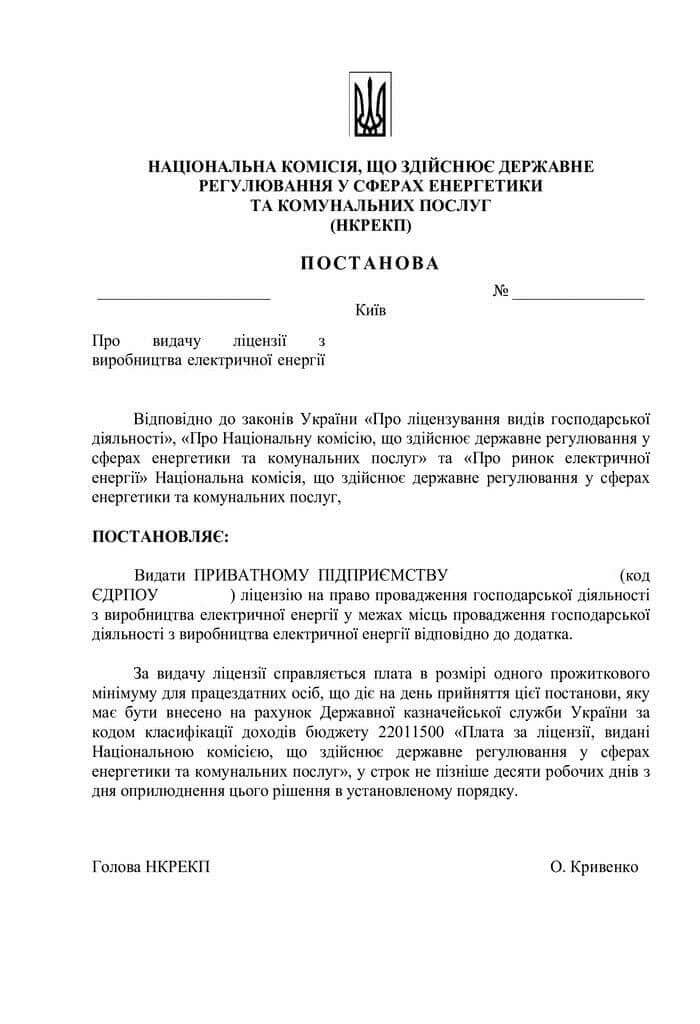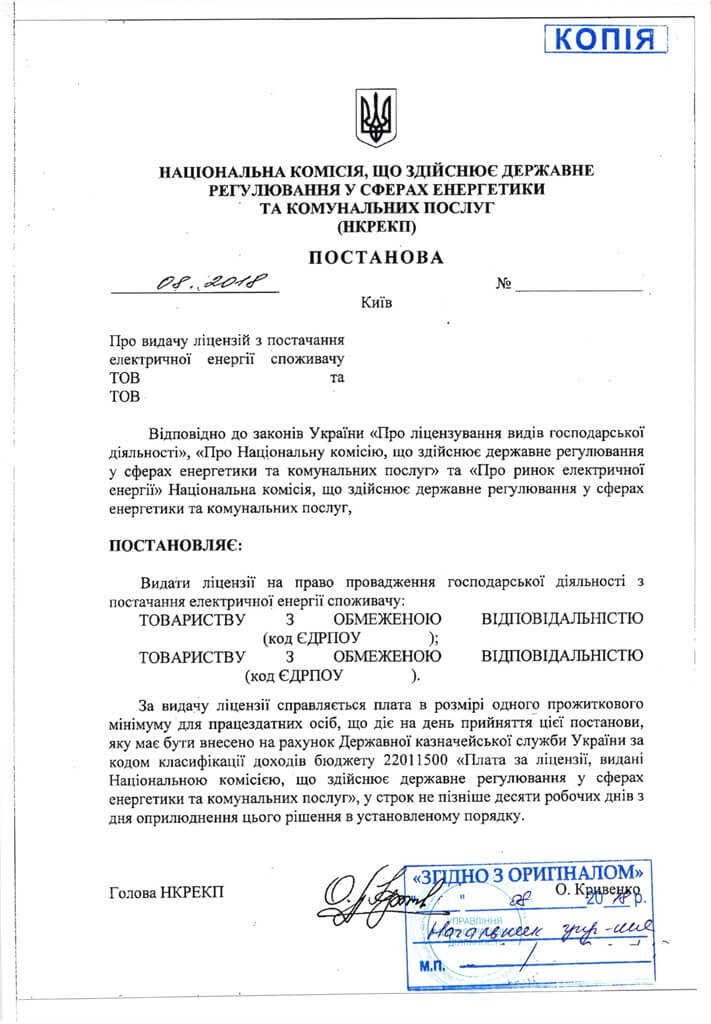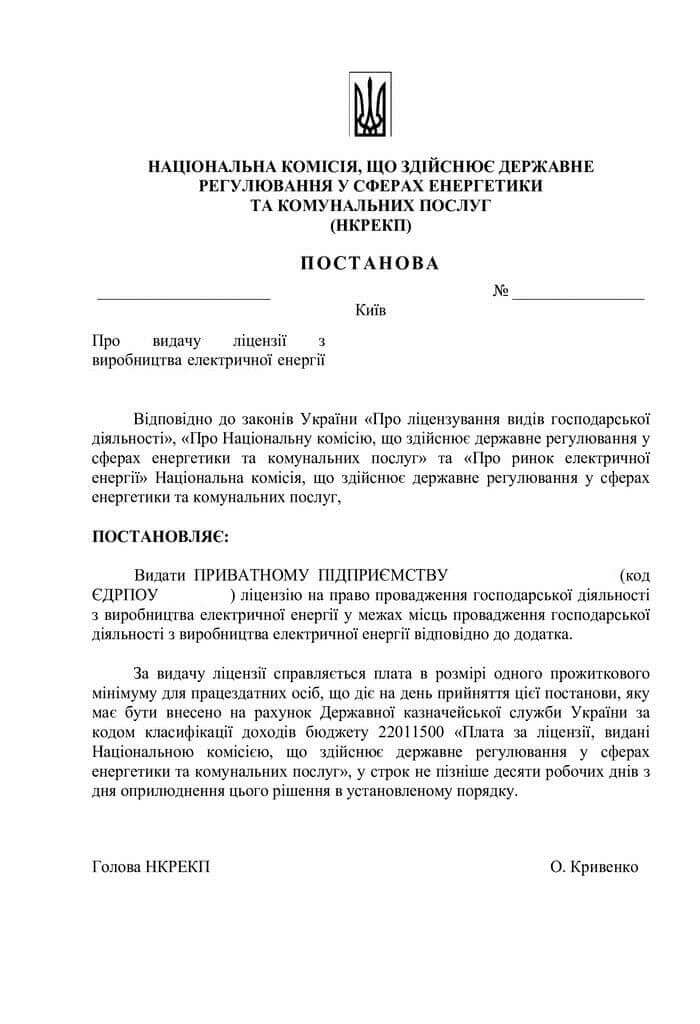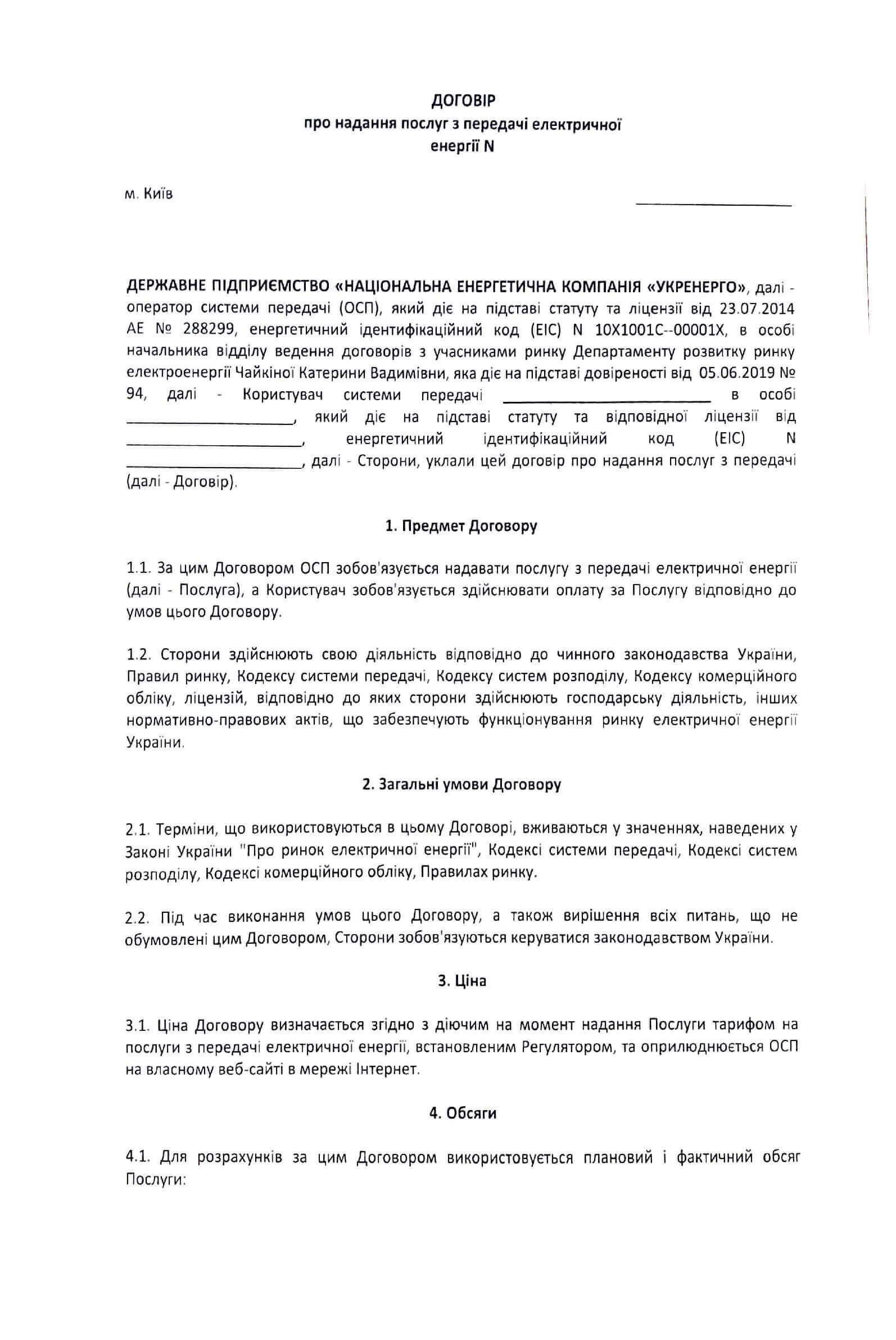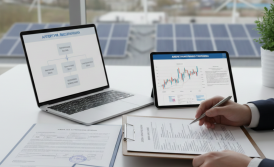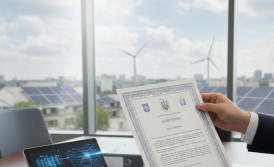Electricity Generation License: When Is It Required?
Cost of services:
Reviews of our Clients
... our work on joint projects assured us of your high level of professionalism
In Ukraine, an increasing number of businesses and individuals are investing in power generation by installing solar panels, wind turbines, and other energy-generating equipment. This trend not only reduces dependence on traditional suppliers and provides energy resilience during blackouts but also contributes to the growth of green energy. However, legal regulation in this field remains complex and unfamiliar to many. As a result, owners of generating facilities frequently ask us the following questions:
- Is a license required for those generating electricity for personal use?
- What specific type of license is necessary if electricity is also supplied to other consumers?
- What documents are required to operate in the electricity generation sector?
- Where and how can one obtain a license for electricity generation in Ukraine?
In this article, we will examine the specifics of electricity production licensing in Ukraine and identify the situations where obtaining a license is mandatory. Our experts will outline critical aspects to focus on and important details to consider to ensure compliance with regulations and effectively organize activities in the energy sector.
You might also like: How Much Does the State Pay Under the Feed-In Tariff?
Licensing Electricity Production and Supply: When Is It Required and When Is It Not?
Under the licensing regulations, owners of power-generating facilities must obtain a license for electricity production if the total capacity of equipment at a single site exceeds 5 megawatts. Similarly, a license is mandatory if the combined capacity of equipment across all sites exceeds 20 megawatts. These requirements are primarily aimed at large electricity production facilities capable of significantly influencing the national energy system. However, when the capacity is below 5 megawatts, questions often arise: is a license required in such cases? A plain reading of the licensing regulations suggests that this requirement does not apply to small-scale generation capacities.
Let’s examine the legislative requirements for licensing electricity production in more detail to clarify when licensing might not be necessary and to mitigate potential risks. Under the law, electricity generation requires licensing regardless of a facility's capacity if the production is incentivized through a feed-in tariff or auction-based pricing. In other words, if you operate a power-generating installation using alternative energy sources and its production qualifies for a feed-in tariff, obtaining a license is mandatory, even if the facility's capacity does not meet the 5-megawatt threshold. This rule applies, for instance, to solar power plants.
You might also like: Why Is It Important to Submit Blank Reports to the NEURC? What Happens If You Fail to Submit?
How to Determine Whether a License for Electricity Production Is Required
The licensing regulations specify cases where obtaining a license for electricity production is not mandatory. A license is not required if:
- Electricity is produced exclusively for personal use (regardless of the facility's capacity), and there is no intent to sell it under a contract.
- Electricity is produced using a mobile or autonomous installation during martial law and up to six months after its conclusion.
The conditions outlined above represent the ideal scenarios envisioned by lawmakers when drafting the licensing regulations. However, in practice, these ideal conditions often do not align with reality. Here’s a real-world example: a generating facility produces significantly less than 5 MW of electricity. The owner of the facility wants to sell electricity to nearby businesses. If their own capacity is insufficient, they plan to purchase additional electricity from the market and resell it. Sound familiar? In such a case, the question arises: is obtaining a license necessary, and if so, what specific type of license is required?
This question is quite common in practice, and the answer is not always straightforward. Let’s break it down. Article 58-1 of the Law "On the Electricity Market" introduces the concept of an active consumer. Yes, not just a consumer, but an active consumer. This refers to a consumer who is also a customer of energy services, consuming electricity while simultaneously (and here’s the key point!) producing electricity. An active consumer may also:
- Engage in activities related to the storage of electricity;
- Sell surplus electricity that is either generated or stored;
- Participate in energy efficiency and demand-side management initiatives.
This applies provided that such activities are not the consumer’s primary business but are necessary to support their main operations. So, what makes the status of an active consumer particularly interesting?
According to this article, an active consumer (like a regular consumer) can independently install generating facilities for electricity production. Additionally, the consumer has the right to connect generating facilities owned by third parties to their own systems. They can also connect energy storage facilities. This is permissible under the condition that the entire volume of electricity generated by these facilities must be purchased by the consumer themselves, and the entire volume of electricity consumed by third-party-owned storage facilities must be bought or sold exclusively by the consumer.
And now, the key takeaway: transactions involving the sale of electricity to a consumer, where the electricity is generated by facilities or supplied from storage systems owned by third parties and connected to that consumer's network, are not considered electricity supply to the consumer. Consequently, a license is not required. In conclusion, if you act as a third party in relation to an active consumer, and that consumer connects to your facilities, complies with the established requirements, and adheres to the permitted electricity generation volumes, such activity will not be considered as the supply of electricity to the consumer.
However, if you own generating facilities and do not have an ideal active consumer, and you plan to sell electricity to various consumers while purchasing electricity from the market to cover production shortfalls and reselling it, you will need to obtain a supply license (and in this case, both production and supply licenses) and participate in the electricity market.
You might also like: Integration of Suppliers into the Wholesale Energy Market: Terms and Methods
What Is Required to Obtain a License: Eligible Facilities and Necessary Documents
To obtain a license for electricity production, the first and foremost requirement is an electronic digital signature (EDS), also known as a qualified electronic signature (QES). This is a non-negotiable prerequisite. Beyond the basic items, such as an application and general information, the following documents are required:
- Documents confirming ownership of or the legal right to use the facilities.
- Technical passport(s) for the generating equipment.
- Connection diagrams showing how the energy facilities are linked to the electrical grid, including the placement of electricity metering devices.
- A document certifying the readiness of a newly constructed electricity facility for operation, which must also detail its technical and economic indicators. If the facility includes an energy storage installation, you must also provide a connection diagram for this installation, showing its integration with your electricity facilities and the grid, along with the placement of electricity metering devices.
A license can only be granted if you possess a complete set of documentation for your equipment. This includes any generating facilities permitted for use in Ukraine, but it is essential that these facilities are accompanied by the appropriate technical documentation. In other words, assembling a generating facility by combining parts from various installations and attempting to produce electricity is not acceptable. Likewise, it will not be possible to obtain a license for used equipment that lacks the necessary documentation.
How to Obtain a License for Electricity Production
The process of obtaining a license for electricity generation is as follows. Once all the required documents for the generating facility have been collected and meet the necessary standards, and the application and accompanying information have been properly completed, you can proceed to submit the documents. Submissions are made exclusively online through the Ministry of Economy's Electronic Services Portal.
You don’t need to register immediately—you can log in using your electronic digital signature (EDS or QES). After logging in, click on "Online Services" and navigate to Natural Resources and Ecology → Energy and Energy Efficiency → Issuance of a License for Electricity Production Business Activity.
We trust you will navigate the process of submitting documents through the electronic portal and adapt it to your specific situation. If you have any questions or require assistance, don’t hesitate to contact us. Our legal team has years of experience in managing such processes and is always ready to support you at any stage of obtaining a license for electricity production.
If needed, we will provide consultations and reliable guidance on all matters related to Ukraine’s energy market. Reach out to our specialists—working with us will make the entire process simple and convenient!
Learn more about obtaining a license for electricity production here.
Our clients



